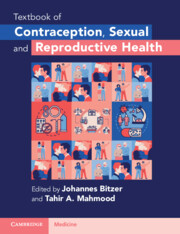Book contents
- Textbook of Contraception, Sexual and Reproductive Health
- Textbook of Contraception, Sexual and Reproductive Health
- Copyright page
- Contents
- About the Authors
- Contributors
- Section 1 Sexual and Reproductive Health and Rights, Public Health Aspects and Prevention in Sexual and Reproductive Healthcare
- Section 2 Sexual and Reproductive Healthcare
- Section 3 Sexual Healthcare
- Section 3A Sexual Dysfunction and Counselling
- Chapter 46 Sexual Counselling
- Chapter 47 Disorders of Desire, Arousal and Orgasm in the Female
- Chapter 48 Sexual Pain Disorders in the Female
- Chapter 49 Vulvodynia
- Chapter 50 Disorders of Desire, Arousal and Orgasm in the Male
- Section 3B Sexual Healthcare along the Life Course
- Section 4 Sexual and Reproductive Health Indicators and Policies
- Index
- References
Chapter 46 - Sexual Counselling
General Principles
from Section 3A - Sexual Dysfunction and Counselling
Published online by Cambridge University Press: 16 January 2024
- Textbook of Contraception, Sexual and Reproductive Health
- Textbook of Contraception, Sexual and Reproductive Health
- Copyright page
- Contents
- About the Authors
- Contributors
- Section 1 Sexual and Reproductive Health and Rights, Public Health Aspects and Prevention in Sexual and Reproductive Healthcare
- Section 2 Sexual and Reproductive Healthcare
- Section 3 Sexual Healthcare
- Section 3A Sexual Dysfunction and Counselling
- Chapter 46 Sexual Counselling
- Chapter 47 Disorders of Desire, Arousal and Orgasm in the Female
- Chapter 48 Sexual Pain Disorders in the Female
- Chapter 49 Vulvodynia
- Chapter 50 Disorders of Desire, Arousal and Orgasm in the Male
- Section 3B Sexual Healthcare along the Life Course
- Section 4 Sexual and Reproductive Health Indicators and Policies
- Index
- References
Summary
The US National Health and Social Life survey, which was undertaken in people aged 18–59 years, reported that sexual dysfunction is more prevalent for women (43%) than men (31%) [1]. Another US study of 1,550 women and 1,455 men aged 57–85 years found that the prevalence of sexual activity declined with age (73% among respondents 57–64 years of age, 53% among respondents 65–74 years of age and 26% among respondents 75–85 years of age); women were significantly less likely than men at all ages to report sexual activity [2].
- Type
- Chapter
- Information
- Textbook of Contraception, Sexual and Reproductive Health , pp. 289 - 293Publisher: Cambridge University PressPrint publication year: 2024



